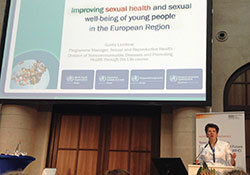Achievements and challenges in improving sexuality education discussed at SE:LFIE

WHO
On 15–16 May 2017, the German Federal Centre for Health Education (BZgA), a WHO Collaborating Centre for Sexual and Reproductive Health, hosted the international conference “Sexuality Education: Lessons Learned and Future Developments in the WHO European Region (SE:LFIE)”. Held in Berlin, the conference was organized by BZgA, supported by the German Federal Ministry of Health and the Federal Ministry for Family Affairs, Senior Citizens, Women and Youth. The International Planned Parenthood Federation European Network (IPPF EN); the United Nations Population Fund (UNFPA) Regional Office for Eastern Europe and Central Asia; the United Nations Educational, Scientific and Cultural Organization (UNESCO); and WHO/Europe were also actively involved in organization of the conference . Over 160 participants from 33 countries of the WHO European Region attended the meeting, representing ministries of health and education, health-care providers and public health specialists, schools and research institutions, and nongovernmental organizations, including youth organizations.
In her opening speech, Dr Heidrun Thaiss, Director of BZgA, emphasized the importance of health education, including sexuality education, in achieving the goals of Health 2020 and the “Action plan for sexual and reproductive health: towards achieving the 2030 Agenda for Sustainable Development in Europe – leaving no one behind” (2016).
Dr Gunta Lazdane, Programme Manager for Sexual and Reproductive Health at WHO/Europe praised the intersectoral collaboration involved in the development of the conference and health promotion in general. She also highlighted the links with the implementation of the Minsk Declaration on the Life-Course Approach in the Context of Health 2020 and the outcome recommendations of the Paris high-level conference “Working together for better health and well-being (2016 ) .
Sexuality education is a crucial element in supporting the healthy development of children and young people. The 2-day conference included presentations on the results of the latest research and the sharing of successes and lessons learned from programmes active in the field. It also featured dynamic exchanges through techniques such as the world café and fish bowl discussion.
The main topics addressed at the conference were based the current status of sexuality education in the Region, trends and challenges related to the implementation and improvement of sexuality education, as well as future strategies and approaches on how to address them. Results of the joint study carried out by BZgA and the IPPF EN on sexuality education in 24 countries of the Region were presented and discussed during the plenary session. Participants also had the opportunity to explore 24 posters presenting the country situations .
Two days of intensive work are over, but many participants have planned the next steps in further implementation of the tools developed by BZgA and WHO/Europe, and have made new contacts with experts who are ready to help them.
Empowerment of people is one of the four priority areas of Heath 2020 and sexuality education is one of the ways to do that.



